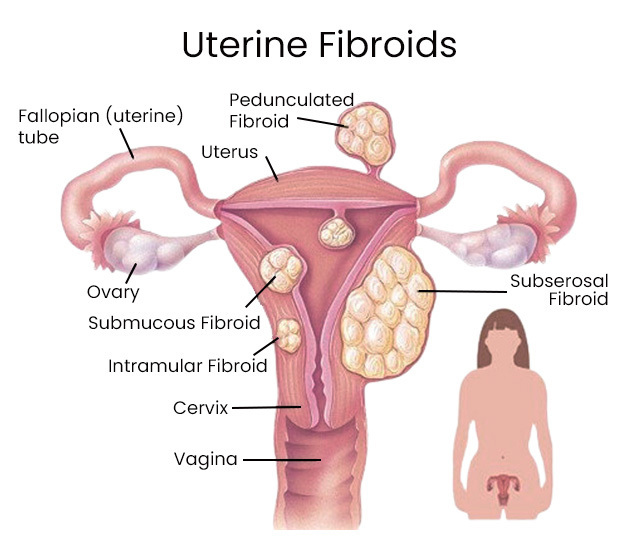While there are a number of reasons why you’re experiencing pelvic pain, two of the most common causes is uterine fibroids, which are growths in your uterus, and adenomyosis, which is when uterine tissue grows into the uterine wall. Fibroid pain may be light enough that you don’t need to see a pelvic pain doctor, or it may be so severe that you need to seek chronic pelvic pain treatment now. Call the best pelvic pain specialist in Brooklyn at the Downtown Vein & Vascular Center. You receive the safest and most effective pelvic pain treatment, even if you’re pregnant.
What Is Pelvic Pain?
Pelvic pain in women can be caused by a multitude of issues. Common complications with your menstrual cycle can cause different types of pelvic pain and pressure. Pain during your period or anytime throughout the month may be acute — sharp and severe — or chronic — constant and prolonged. Two of the most common reasons for chronic pelvic pain is the presence of adenomyosis, abnormal growth of uterine tissue, and fibroids, growths that lead to persistent fibroid pain that often worsens over time.
Another common cause of chronic pelvic pain in women is pelvic venous congestion, which is an extension of varicose veins in your pelvis. Pelvic congestion syndrome is a condition characterized by the stagnation of blood in the veins of your pelvis due to increased venous pressure, venous outflow obstruction or incompetent valves.
For chronic pelvic pain treatment in New York City, rely on an expert pelvic pain doctor at the Downtown Vein & Vascular Center. Whether you’re experiencing pelvic pain during pregnancy or rectal pressure, along with pain in the pelvic area, Dr. Sergei Sobolevsky provides the best care to suit your specific needs.
What Are Symptoms of Pelvic Pain?
Pelvic pain in women appears in different forms. The discomfort can differ in strength and be localized to one spot, or it can be an ache that seems to spread through your entire pelvis. Pelvic pain also spreads to sensitive areas of your lower back and upper legs.
Following a thorough examination and an in-depth medical and family history, your NYC pelvic pain doctor discovers the root of the problem and prescribes the appropriate pelvic pain treatment.
A few symptoms associated with pelvic pain include:
- Hip pain. Occurring around your hip sockets, groin, lower back and upper legs, hip pain can be a sudden sharp pain in a certain spot or a dull pain that seems to spread.
- Pain during sex. Intercourse may suddenly become painful or develop gradually, especially if you have fibroids that continue to get bigger.
- Vaginal bleeding. Light or constant bleeding and spotting between your periods is a clue that you need to seek a diagnosis from a pelvic pain doctor.
- Rectal bleeding may be a sign of disease of your colon, such as colon cancer, or due to the constant pressure of an enlarged uterus on your pelvic organs, leading to hemorrhoids.
- Bloating and gas. Intestinal gas pain and bloating can put added pressure on your abdominal organs, causing pelvic pain. Abdominal and pelvic pain is also a common condition of fibroids
- Painful or frequent urination. Stinging or burning pain when you pee can alert doctors to an issue within your urinary track that’s also causing pain in your pelvic Pressure from your uterus also leads to the need to urinate more often.
★ ★ ★ ★ ★
Thoroughly Impressed
I was thoroughly impressed with Dr. Sergei’s expertise and professionalism during my vein treatment. He took the time to answer all of my questions and made me feel comfortable throughout the procedure. I’m thrilled with the results and would highly recommend him to anyone seeking vein treatment.
What Are the Causes of Pelvic Pain in Women?
The most common source of female pelvic pain concerns problems within your reproductive system. Infections or other conditions within the uterus, ovaries and fallopian tubes can cause swelling and inflammation resulting in pelvic pain.
If you have additional symptoms like heavy periods, get an evaluation and pelvic pain treatment as soon as possible to find out if you have one of the most common sources of pelvic pain that include:
- This condition occurs when the tissue of the lining in your uterus is abnormally present in the uterine muscle wall.
- Menstrual cramps. Severe menstrual cramps may be a symptom of a bigger problem within your reproductive system. Cramps that keep you from your daily routine are often associated with prolonged and heavy periods or bleeding between periods.
- Pelvic inflammatory disease (PID). PID occurs when an area of your reproductive system becomes infected with bacteria, usually sexually transmitted. Infections within the ovaries, uterus or fallopian tubes cause inflammation and swelling within your pelvis.
- Uterine fibroids. These are benign tumors inside or outside your uterus that can cause heavy bleeding, severe cramping and pelvic pain outside of normal period discomfort.
- Fertility issues. If you’ve been experiencing pregnancy-related issues — such as an ectopic pregnancy, multiple miscarriages or pelvic pain during pregnancy — consult a pelvic pain doctor.

What Are My Options for Chronic Pelvic Pain Treatment?
Once your doctor successfully narrows down the source of your pelvic pain, a treatment path can be devised. A top pelvic pain doctor has many different treatment options. The Downtown Vein & Vascular offers a range of solutions to treat you.
The most common types of pelvic pain treatment include:
- Anti-inflammatory medicines and pain medications calm inflamed areas in your pelvis.
- Physical therapy. PT can alleviate pelvic pain by strengthening the muscles in the pelvic area, creating more flexibility and functionality within the pelvic joints, when indicated.
- Uterine fibroid embolization (UFE). If your pelvic pain is due to fibroids or adenomyosis, a UFE provides enormous benefits, low risks and a quick recovery. The procedure blocks the blood supply to the fibroids, causing them to shrink, creating fewer problems.
- A myomectomy or hysterectomy. Surgery may also be an option. A myomectomy involves the removal of fibroids, while a hysterectomy is the removal of your uterus and ovaries.
For the most appropriate and effective chronic pelvic pain treatment, contact the team at the Downtown Vein & Vascular Center. Rely on the best pelvic pain specialist in NYC to provide you with proper care.

I am Dr. Sergei Sobolevsky, a leading specialist in endovascular medicine. Having performed over 25,000 procedures throughout my career, I bring decades of experience in vascular and interventional radiology to my practice. I obtained my Doctor of Medicine (MD) degree from the University of Colorado School of Medicine in 1997 and completed my specialty clinical training in vascular and interventional radiology at Harvard University.
My dedication to excellence in patient care has been recognized through accolades such as being named a Castle Connolly Top Doctor and inclusion in the Top Doctors New York Metro Area lists for 2020, 2021, 2022, and 2023. With licenses in multiple states, I have also shared my expertise through presentations at various institutions in the US and abroad.
More About Dr. SobolevskyDowntown Vein Treatment Center
480 Court Street, Ste 101
Brooklyn, NY 11231
(718) 787-5559


